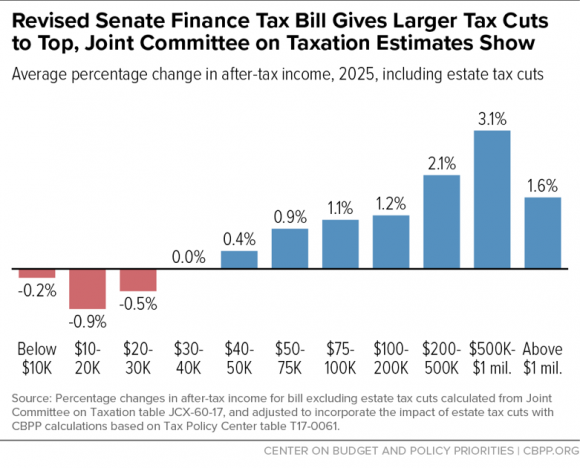The Joint Committee on Taxation (JCT) has evaluated the distributional impact of the Senate’s plan. CBPP has graphically depicted the impact on households, adjusting the JCT figures to account for the provisions regarding estate taxes:

Source: CBPP.
In other words, by 2025, households with income less $30,000 experience a net decrease in after-tax income. Households with income greater than that experience net increases. The category of $500,000-$1,000,0000 experience a 3.1% gain(!).
CBPP summarizes the causes for this regressivity concisely:
The bill’s large tax cuts for high-income households reflect a series of provisions that provide large benefits to the wealthy but little or nothing to everyone else. These include: corporate rate cuts, the benefits of which flow overwhelmingly to wealthy investors and CEOs; the large estate tax cut; a tax cut for “pass-through” income, or income that owners of such businesses as partnerships, S corporations, and sole proprietorships claim on their individual tax returns and that is taxed at the same rates as wages and salaries; repeal of the Alternative Minimum Tax, which is designed to ensure that the wealthiest households pay at least some minimum level of tax; and a cut in the top individual income tax rate.
The CBPP calculations do not take into the expenditure-side implications of implementing the tax plan and budget bill. As noted in this post, spending cuts may be necessary in order to conform to the Senata budget bill, which limits deficit increases relative to baseline to $1.5 trillion over ten years. Nor do they take into account the higher premiums that would likely occur with the elimination of the ACA individual mandate.
Let me just say, I am unsurprised by the sheer brutality of the Senate GOP leadership. This tax plan perfectly epitomizes the Hobbesian view of these people:
“At this festive season of the year, Mr Scrooge, … it is more than usually desirable that we should make some slight provision for the Poor and destitute, who suffer greatly at the present time. Many thousands are in want of common necessaries; hundreds of thousands are in want of common comforts, sir.”
“Are there no prisons?”
“Plenty of prisons…”
“And the Union workhouses.” demanded Scrooge. “Are they still in operation?”
“Both very busy, sir…”
“Those who are badly off must go there.”
“Many can’t go there; and many would rather die.”
“If they would rather die,” said Scrooge, “they had better do it, and decrease the surplus population.”









Leave A Comment